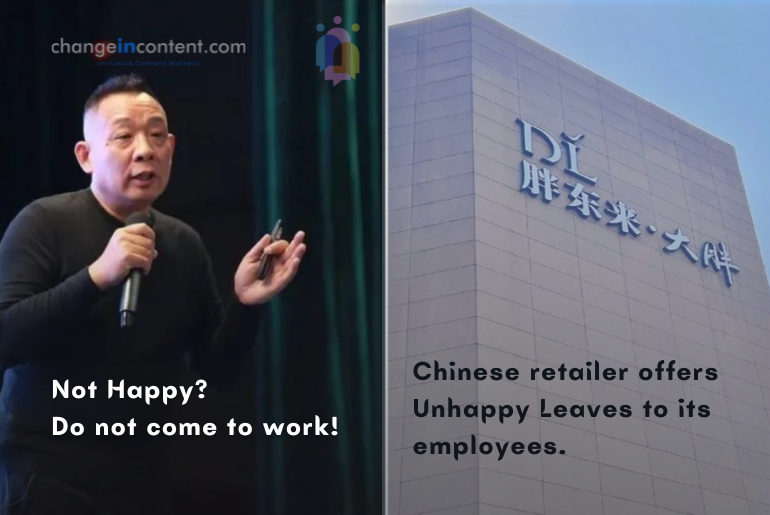In an unprecedented move, Chinese retail tycoon Yu Donglai, founder and chairman of Pang Dong Lai, introduced a new policy allowing employees to take “Unhappy Leaves.” The idea is simple yet revolutionary—if an employee is unhappy, they can take up to 10 days off, no questions asked. Yu Donglai believes that workplace happiness is critical to an organisation’s success. Hence, he has made it mandatory for management not to deny these leaves.
This policy, termed “Unhappy Leaves,” has ignited widespread conversations about workplace well-being. It challenges traditional corporate norms where productivity often overshadows employee satisfaction. As workplace anxiety rises globally, such initiatives may provide a roadmap for organisations striving to prioritise mental health.
What are these Unhappy Leaves?
The Unhappy Leaves policy allows employees to take additional time off if they feel unhappy or emotionally unwell. Yu Donglai stated that these leaves are non-negotiable, and denying them would be considered a policy violation. The company’s work culture already includes impressive benefits:
- Seven-hour workdays
- Weekends off
- 30 to 40 annual leave days
- Five days off during the Lunar New Year
This policy reflects Yu Donglai’s belief in “freedom and love” as essential pillars of both employee well-being and organisational growth. According to him, “We do not want to be big. We want our employees to have a healthy and relaxed life, so that the company will too.”
A bold move in workplace policies
Yu Donglai’s approach stands in stark contrast to the notorious “996” work culture in China. This 996 work culture demands employees work from 9 a.m. to 9 p.m., six days a week. Critics have long argued that such extreme work hours compromise mental health and overall productivity.
With Unhappy Leaves, Yu Donglai is challenging this norm and offering an alternative that prioritises employee well-being over relentless output. The founder has also condemned overtime practices, calling them “unethical” and theft of personal growth opportunities.
Previously, Pang Dong Lai introduced other progressive measures, such as a job-level certification system where even janitorial staff can earn up to 500,000 yuan (US$70,000) annually based on their professional capabilities.
Global Reactions to Unhappy Leaves
The policy has received overwhelming support on Chinese social media platforms like Weibo. Users hailed Yu Donglai as a progressive leader, with comments such as:
- “Such a good boss, and we should promote this company culture nationwide.”
- “I want to switch to Pang Dong Lai. I feel like I would gain happiness and respect there.”
However, some critics argue that such policies might be difficult to implement in industries with tight deadlines or labour-intensive work environments. While people are widely praising the concept, its feasibility across sectors remains a topic of debate.
Workplace anxiety: The numbers speak
The introduction of Unhappy Leaves comes at a time when workplace anxiety is becoming a pressing issue. According to a 2021 survey on workplace stress in China, more than 65% of employees reported feeling tired and unhappy at work. The problem extends beyond China. Global surveys consistently reveal that burnout and stress are rampant in modern workplaces.
In this context, the Unhappy Leaves policy serves as a much-needed intervention. They encourage companies worldwide to reconsider their approach to employee happiness.
Changeincontent’s perspective on unhappy leaves
While the Unhappy Leaves policy is a bold and commendable step, workplace well-being requires more than just additional leave days. At Changeincontent, we believe that sustainable happiness stems from a holistic approach to workplace culture.
As Saransh Jain, Founder of Changeincontent, aptly puts it:
“Policies like Unhappy Leaves spark important conversations, but true workplace happiness is built on trust, empathy, and daily support. It’s not about days off; it’s about creating a culture where every day feels meaningful and empowering.”
Unhappy Leaves may be the beginning of a larger movement to prioritise mental health in the workplace. However, the ultimate goal should be to foster environments where employees feel valued and supported every day, not just during their time off.
The final thoughts
The Unhappy Leaves policy introduced by Pang Dong Lai is a pioneering step in addressing the mental health needs of employees. It challenges conventional norms and provides a refreshing alternative to the grind culture that dominates many workplaces. While it may not be a one-size-fits-all solution, it opens the door for companies worldwide to rethink their priorities and take meaningful steps towards workplace happiness.
By sharing this story, Changeincontent hopes to inspire organisations to explore innovative ways to support their teams. After all, happy employees are the foundation of a thriving business.
Disclaimer: The views expressed in this article are based on the writer’s insights, supported by data and resources available both online and offline, as applicable. Changeincontent.com is committed to promoting inclusivity across all forms of content, which we define broadly to include media, policies, law, and history—encompassing all elements that influence the lives of women and gender-queer individuals. Our goal is to promote understanding and advocate for comprehensive inclusivity.


